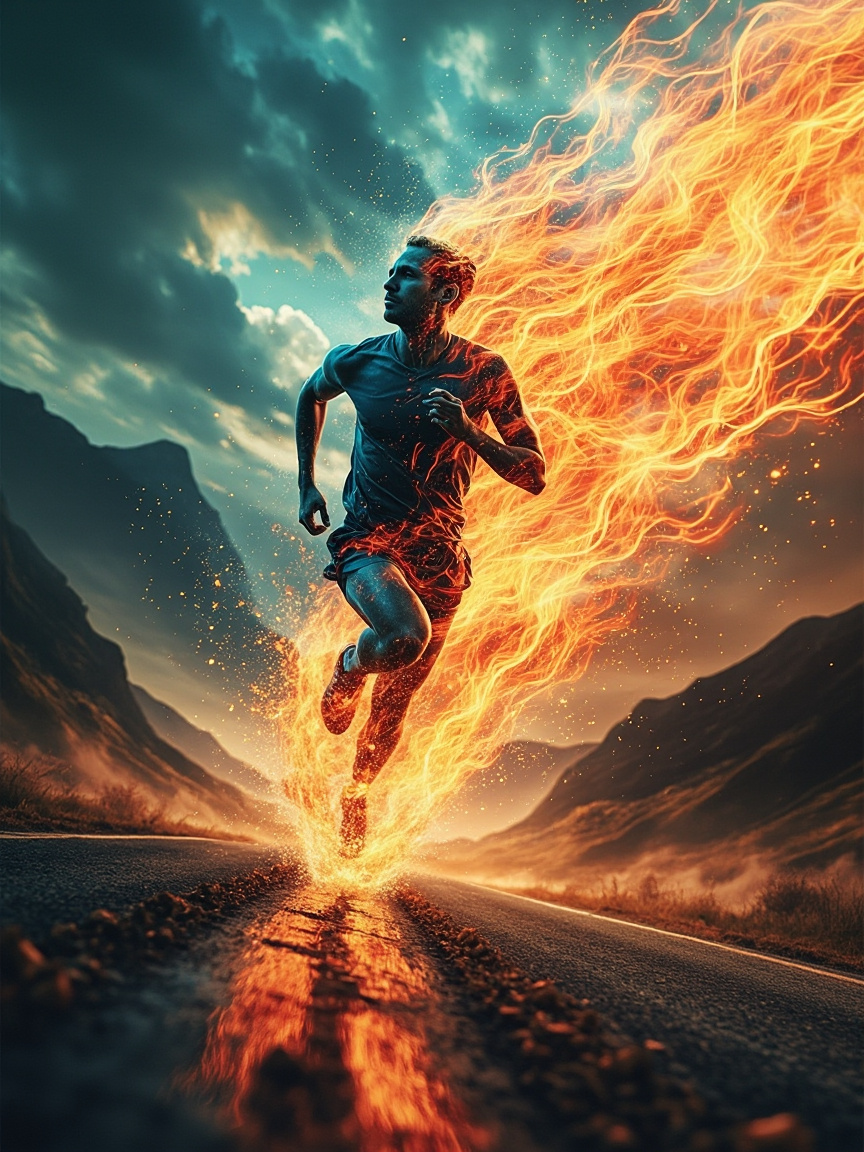Introduction
Running is one of the most primal, unfiltered expressions of human movement. It is both deeply personal and universal, requiring nothing but a body, a mind, and the will to move. Yet, in its simplicity, running reveals everything about the runner—his mind, his fears, his weaknesses, and his ability (or inability) to surrender.
Modern thought has corrupted running, reducing it to a game of numbers, competition, and external validation. Runners speak of “splits,” “VO2 max,” and “training regimens,” as if performance is all that matters. But at its core, running is not about speed, distance, or trophies. It is about something much deeper. It is about mastery—not over others, but over oneself.
And the greatest enemy one must master is pain.
The body does not quit; the mind does. Fatigue is an opinion. Pain is not what stops you—your resistance to pain is. The runner who transcends, who reaches the highest level of purity in movement, is the one who understands this truth. The one who learns to embrace, to surrender, and to strip away the false stories the mind tells.
The Nature of Pain: What It Really Is
Pain is not the problem. It is the reaction to pain that makes it unbearable.
Pain, in itself, is simply sensation. It is not good or bad. The body sends signals—burning muscles, pounding heart, aching lungs. This is natural. But the mind, conditioned by fear and comfort, steps in and distorts the experience. It labels pain as suffering. It resists. It screams, “This is too much!” “You cannot go on!” “You must stop!”
But who is speaking?
It is not the body. The body is capable of far more than the mind believes. It is the conditioned self—the fragile, fearful part of you that seeks escape the moment discomfort arises.
A true runner understands this. She sees pain for what it is: just another part of the run. She does not attach meaning to it. She does not negotiate with it. She lets it be. And because she does not resist it, pain does not control her.
The average runner spends most of his energy in battle—not against the road, not against the race, but against himself. He fights the fatigue, he fears the discomfort, he looks for an excuse to slow down, to stop. But this is wasted energy. The moment he stops fighting, the moment he simply allows pain to exist without resistance, something incredible happens: the pain loses its grip.
The Illusion of Limits: What Lies Beyond “Unbearable”
Every runner has experienced it—the moment when the pain feels overwhelming, when the mind insists that you have reached your limit. But this is a lie.
What is actually happening? The body is still moving. The lungs are still breathing. The legs are still driving forward. But the mind is screaming for relief. It is looking for permission to quit.
But here is the truth: if you do not give in, if you simply observe the pain rather than react to it, you will find something remarkable—beyond unbearable, there is another side. And on that side, there is still movement. There is still strength. And if you push through, you will realize something few ever do:
There was never a limit. Only a belief in one.
Pain rises. Fear rises. But they pass—if you let them. If you do not break, they lose power. And once you have seen that, once you have touched the other side of unbearable, you are no longer the same. Because now you know—it was never real.
Surrender: The Key to Effortless Running
Effortlessness does not mean the absence of effort. It means the absence of struggle.
The weak runner fights the run. He tenses against the fatigue. He battles every step. His mind is loud, filled with doubt and calculation. He is running against something—against pain, against limits, against himself.
The true runner does not fight. He does not waste energy resisting what is. He surrenders—not in defeat, but in absolute acceptance.
Pain? It is there. He does not judge it.
Fatigue? It is there. He does not resist it.
Fear? It arises. He does not obey it.
He simply runs.
And in that surrender, something extraordinary happens. The body moves freely. The mind quiets. There is no wasted energy in doubt, hesitation, or struggle. There is only motion. Only presence. Only the pure act of running.
This is why the greatest runners seem effortless. It is not because they lack pain. It is because they are unburdened by resistance. They have removed all unnecessary effort, all tension, all inner conflict. They are not running against the pain. They are running with it.
And this is the difference between those who endure and those who transcend.
Conclusion: Why This Matters Beyond Running
This is not just about running. This is about life.
Because everything in life is the same as the run. Pain will come. Fear will rise. The mind will search for an exit. And most people will quit—not because they are broken, but because they believe the illusion that they are.
But the few who do not resist, who do not quit, who surrender fully to what is—these are the ones who transcend. These are the ones who see that suffering was never in the pain itself. Suffering was only ever in the resistance to it.
So when the pain comes—whether in running, in life, in anything—you have a choice.
You can fight it. Fear it. Try to escape it. And suffer.
Or you can accept it. Surrender to it. And move through it untouched.
And in that moment, you will know true freedom. Because you will no longer be owned by pain.
You will simply run.
